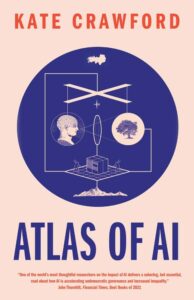Atlas of AI
By Kate Crawford
Review by Alexandra Carvalho
In The Atlas of AI, Kate Crawford demolishes the fantasy of cloud-based cognition. She drags AI out of the ether and roots it firmly in the ground: lithium mines, data centres, warehouses, border camps. Her thesis is clear and sobering, AI is not just a tool, it is an extractive infrastructure, powered by planetary resources, exploited labour, and imperial legacies.
This is not a book about smarter algorithms or safer models. It’s a forensic exposé of the hidden systems, political, economic, ecological, that sustain what Silicon Valley markets as intelligence. Crawford connects the dots between data colonialism, environmental degradation, labour exploitation, and geopolitical dominance, revealing a brutal logic: AI concentrates power by design.
From Amazon warehouses to biometric surveillance at borders, Crawford shows how “innovation” is often a cover for disposability, of workers, of land, of rights. She pushes past the discourse of “ethics” and into systems analysis, calling out the concentration of AI capital and the illusion of neutrality in academic and corporate labs.
Yet this book is not technophobic. It is structurally literate. Crawford writes not to dismiss AI, but to demand that we see it whole.
Key Insight
“There is nothing artificial about AI.”
What we call intelligence is built on carbon, conflict, and consentless datafication. When we map AI systems, we find mines and sweatshops, not magic. The cost of computation is rarely counted in water tables, warehousing injuries, or erased communities, but it must be.
Why It Matters
For those of us working in Responsible AI, The Atlas of AI is indispensable. It challenges us to leave behind narrow debates about fairness metrics and model performance and confront the full lifecycle of AI systems, from extraction to deployment to impact.
Crawford insists that we cannot fix what we refuse to see. AI governance that ignores material reality is not governance. It is theatre.
She also reframes the ethics conversation around power and accountability, not principles, but politics. This is not about “doing better.” It’s about reckoning with what AI has already done.
Read This If You Are:
A policymaker thinking AI regulation starts with model transparency, read this and start with mineral rights and border surveillance.
A tech leader convinced your product is “just a tool”, and ready to interrogate the supply chain that enables it.
A researcher or ethicist still clinging to neutrality, this book will unmask your assumptions.
Crawford’s work belongs on the shelf beside Benjamin, Zuboff, and Eubanks. It will make you uncomfortable, and that’s the point.
What You’ll Walk Away With
A radically expanded definition of “AI”, not as code, but as a global system of extraction.
The ability to spot ethical whitewashing when labour, land, and law are left out of the frame.
A deeper sense of urgency to govern AI not as a product, but as infrastructure, one that shapes lives, geographies, and futures.
📚 Buy the Book
View on Amazon

